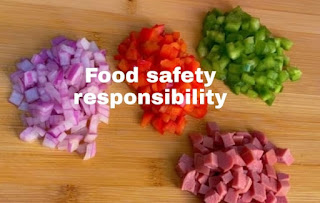Question: The Manager's Most Important Food Safety Responsibility Is Training You To:
a. Know about causes of food poisoning and how to prevent it
b. Work with you to prevent food poisoning
c. Know how to store food at normal food temperature
Answer: a. Know the causes of food poisoning and how to prevent it.
The Manager's most important responsibility is to make sure that all the employees understand the causes of food poisoning and how to prevent it.
Having adequate knowledge, every food handler will know how to protect food and practice good food safety practices. It is however the Manager's food Safety responsibility to ensure that every food handler is trained and monitored to practice these food safety measures.
A manager needs to train every food handler that he/she will be responsible for food poisoning in case of negligence by the handler. And also, a food handler must not touch a prepared food without meeting certain conditions.
 |
| The Manager's Most Important Food Safety Responsibility Is Training You To: |
Proper training from the manager has a great potential to reduce the food poisoning rate in society. WebMD reports that diseases such as vomiting and stomach ache caused by food poisoning can be traced to the result of food handlers touching food with bare hands without washing or sanitizing it. So, it is safe to say that food poisoning is caused mostly by the negligence and result of undertrained food handlers.
Even though the manager's responsibilities to his employee on food safety are numerous, the manager's most important food safety responsibility is training you as an employee to understand the causes and implications of food poisoning. Also, each employee is trained to put food safety practices into practice to eradicate food poisoning.
To ensure that food safety is put first by an employee, the manager however needs to monitor every food handler's work.
Below are other food safety practices that must be exercised by every food handler to eradicate food poisoning.
Other food safety responsibilities of a manager to a food service employee:
It is the food safety responsibility of a manager to train every food handler to;
1. Always wash your hands as often as possible.
2. Not touch prepared food with bare hands without being previously used sanitizer or disinfectant that are safe for food.
3. Food should always stay hot until it is served.
4. Cover the food properly.
5. Separate raw food from cooked food because germs can transfer from raw food to cooked food if packed together.
6. Cook food thoroughly before serving.
7. Kitchen must be clean and safe for use before it could be used.
8. Cooked food is meant to be eaten immediately.
9. Heat food again and again.
10. To avoid spoilage, some food is needed to be stored in the fridge.
Foodservice employee's responsibilities:
After undergoing proper training on food safety under a manager, it is the responsibility of a food service employee also known as a food handler to;
1. Prepare food in a safe place according to the Manager's instructions.
2. Disinfect all the appliances meant for making food for the public.
3. Report to the manager when sick. (This is very important because a sick food handler without proper treatment can in one way or the other contaminate already prepared food.)
4. Notify the manager upon food detection or suspicion of food poisoning.
5. Serve food and make food available for consumption.
Conclusion:
Talking about the manager's food safety responsibility, it is the sole responsibility of a manager to train and monitor the activities of his employee to ensure food safety and minimize the rate of food poisoning. However, the Manager's most important food safety responsibility is to train you to understand what food poisoning is all about, the implications, and what to do to avoid it. This can be considered as the "most important" and should be put above any other responsibility.